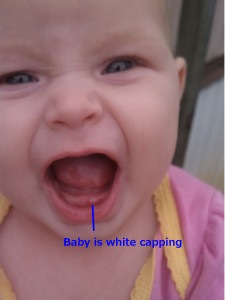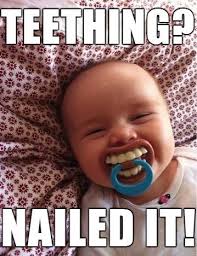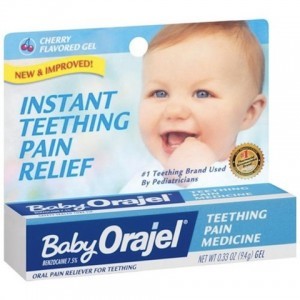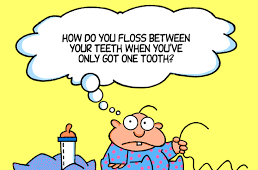Your baby’s first tooth…one of those noteworthy milestones you just have to put down in the baby book! So, what is there to be expected when your baby starts white capping? What type of oral care will your baby require? If you are looking for answers to questions like these then this article is for you!
 Your baby’s teeth actually start developing in the womb by tooth buds forming in the gums and at about 4-7 months old the teeth break through the gums one at a time. The teeth often, but not always, appear in this order: the bottom two middle teeth first, the top two middle ones next, then the ones along the sides and back. They may not all come in straight at first, but usually straighten out over time. They also may start to be erupted at birth or even be delayed until 1 year of age. There is lots of variability.
Your baby’s teeth actually start developing in the womb by tooth buds forming in the gums and at about 4-7 months old the teeth break through the gums one at a time. The teeth often, but not always, appear in this order: the bottom two middle teeth first, the top two middle ones next, then the ones along the sides and back. They may not all come in straight at first, but usually straighten out over time. They also may start to be erupted at birth or even be delayed until 1 year of age. There is lots of variability.
When your baby starts teething, some experience no problems at all, while other parents have reported that their babies do express discomfort.
Symptoms that are most likely to trouble a teething toddler include:
- Irritability or fussiness
- Gum swelling and sensitivity
- Gnawing or chewing behavior
- Trouble sleeping
- Refusing food
- Drooling
 Your baby might also experience loose stool, a runny nose, or a fever just before a new tooth arrives. This is because babies frequently put things in their mouth to soothe their aching gums, putting them into contact with more viruses and germs that can cause sickness.
Your baby might also experience loose stool, a runny nose, or a fever just before a new tooth arrives. This is because babies frequently put things in their mouth to soothe their aching gums, putting them into contact with more viruses and germs that can cause sickness.
A few tricks and tips to help ease your baby’s teething pain include:
Cold compresses: refrigerate a wet wash cloth, teething toy, or pacifier
Use pressure: give them teething toys or gently rub their gums with your clean pinky finger
Topical Medication: numbing gels or cream
Painkillers: Ask your doctor about  painkiller recommendations and proper dosage for your baby. Ibuprofen can be taken by babies at least 6 months old to reduce inflammation of the gums
painkiller recommendations and proper dosage for your baby. Ibuprofen can be taken by babies at least 6 months old to reduce inflammation of the gums
Now that we have the pain under control, it is time to discuss how to take care of your baby’s mouth! Oral care for your baby should begin a few days after birth and will progress throughout their teeth development. If your baby still has that adorable toothless grin make sure to keep their gums clean by wiping them with a clean washcloth or clean finger.
Most important is establishing your babies tolerance of other peoples fingers, washcloths, or toothbrushes in their mouth!
You may be worried about your baby biting you but here is a surefire way to limit them biting:
1) Sit them on the countertop of your bathroom with their feet in the sink.
2) Cradle their head with your arm/hand and place your pointer finger in the side of their lips/mouth. They may resist but use your body position and hands/arms to stabilize them.
3) They may bite you but they have no back teeth, so put your finger all the way back between the gums and let them gnaw away, it won’t hurt and might even amuse both of you!
4) Once you have your finger(s) in position you can use your other hand to massage their gums.
5) As they start to understand this is part of life their resistance will diminish.
 As soon as teeth begin to appear, brushing with toothpaste should begin by using a small amount of toothpaste (about the size of a grain of rice). This will continue until your child turns 3 years old and requires a little more toothpaste for all those teeth!
As soon as teeth begin to appear, brushing with toothpaste should begin by using a small amount of toothpaste (about the size of a grain of rice). This will continue until your child turns 3 years old and requires a little more toothpaste for all those teeth!
Another important aspect of oral care is seeing your dentist! As soon as your baby’s first tooth appears it is time to schedule a dental appointment. The ADA recommends that the first dental visit should take place 6 months after the first tooth appears, and no later than a child’s first birthday. Here at DurhamDDS we treat children of all ages and welcome when parents bring their young children with them for their cleaning appointment. The little kids (under 3 years old) get a real kick out of sitting on mom or dad’s lap and watching as their parents get their teeth cleaned. This type of visit helps young patients (children under 4 years old) gain a positive first impression of the dentist and helps build a sense of safety in the child’s mind right away. Your child’s first dedicated dental visit is mainly to reinforce that sense of trust with your child as well as provide coaching to you.
Early oral care habits last a lifetime! Your children see and hear everything that you do (and usually repeat your words at incredibly bad times in front of the wrong person!), so when it comes to dental care be a great example for them by being a proactive, prevention-oriented parent!
Did your baby’s first tooth finally break through? After you jot down the date in the baby book, give DurhamDDS a call to schedule your little one’s first dentist appointment! Our office can be reached at 919-286-0779. If you are seeking for more information about our services visit our website at durhamdds.com. Did you find this article helpful? Like us on Facebook or +1 us if you are a gmailer at the top of the article! Thanks for reading!